Rauan Klassnik
http://rauanklassnik.blogspot.com
author of three collections: Sky Rat (Spork, 2014), The Moon's Jaw (Black Ocean, 2013) and Holy Land (Black Ocean, 2008) ... ----- @klassnik ------
http://rauanklassnik.blogspot.com
author of three collections: Sky Rat (Spork, 2014), The Moon's Jaw (Black Ocean, 2013) and Holy Land (Black Ocean, 2008) ... ----- @klassnik ------
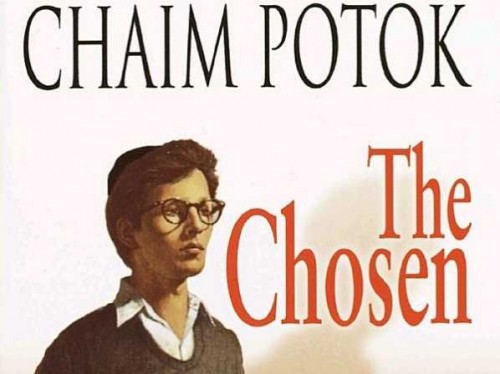
******************
From now on, let’s say, I’m only going to acquire my books at Garage Sales. And then I’m going to write about them. This, then, is the first in a series I’m super psyched about. And I think I’m going to use this opportunity, also, to get serious and personal. Well, kind of,….
******************
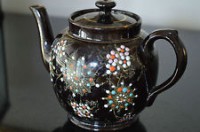
worth about $20
Okay, so a few days ago I bought Chaim Potok’s “The Chosen” at a yard sale close to my house. (Lately, on weekends, I’ve been trolling the neighborhoods because my wife collects teapots and it’s romantic to bring her home something nice. Last week I found a teapot it turns out was made in 1906. It’s worth about $20. Sometimes my wife, Edith, and I go hunting together and that, maybe, is the best).
When I asked the old man standing behind the table with just six books spread over it how much he wanted for “The Chosen” he took a few moments and then replied, “I dunno, how about two bucks?” I quickly countered with a shrug. And then: “how about a dollar?” And the book was mine! (note: this is how “the game” works at Garage Sales. Plus, I’m Jewish. Well, I was born into a Jewish family. I still identify, culturally. Blah. Blah. It’s complicated.) READ MORE >
every day i take a look at the Poem-A-Day from The Acadamy of American Poets that arrives in my email inbox because, well, it’s usually something I can laugh about if I’m in that sort of mood.
most of these poems are, of course, pale drivel. but, every now and then a real gem like this one shows up.
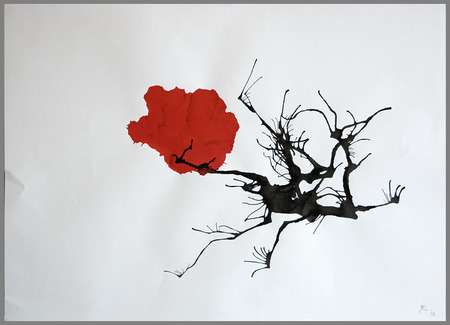
Why you or anyone should read my book? What a question! …Wait, is this coy?–or cute (you know, cute in that slanted way)? Or too eager, perhaps? I don’t want to muff this.
I won’t start off by mentioning how Rise and Shine (my book) was written during one of the worst stretches of my life, in sickness and in anger, and how I worked my nerves murderously to keep patience with it and then thinned myself to barely more than a front and back cover stripping everything down to sharpness and…and…what’s the antimorph to blurtiness?–I won’t, as buckets of blood don’t much matter to the literate consumer unless they’re dumped ministerially from time to time in the plot.
That was a long sentence. Sorry. There are not many in my book. Maybe that’ll recommend it. It’s handsomely broken up. Form, as well as the content. It’s a first-person narrative. And a first-person narrative that obeys verisimilitude.
There are no words like “verisimilitude” in my book; so no one should feel hightalked. Not to say what’s inside will turn away intellectuals, real or imagined. No. It is turned away from clunkiness. Or holds it to effect when the finely patterned sensibleness of the world collapses. You’ll see what I mean. When you read my book.
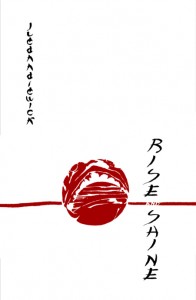
“It sure has some cover, doesn’t it?”
It is fiction. It is novella. It hews closest to the tradition of what Mark Twain called the “humorous story.” It–
It sure has some cover, doesn’t it? It tells you right off about the writing inside. The plot? You get what is depicted about a third of the way through. It resonates throughout; I’ll say that much. Although you might not know it until you come to the end. Of my book. Read it.
As it happens, there’s not much blood. It stands a chance you’ll think that funny once you’ve read my book. I’m not going to tell you here why, of course. A lot of the work I was hooting above was done so the reader would enter and wade the story as though entering and wading quicksand. While sleepwalking. It is that finicky. Sorry. But those of you who do read my book will appreciate this, and I’ll appreciate this, and we’ll all be appreciated together on some appreciable bed of daisies. Oxeye daisies. There’s oxeye daisies in my book. An invasive species in some parts of the world… (Judah Hardwick, 8/2014, Buffalo)
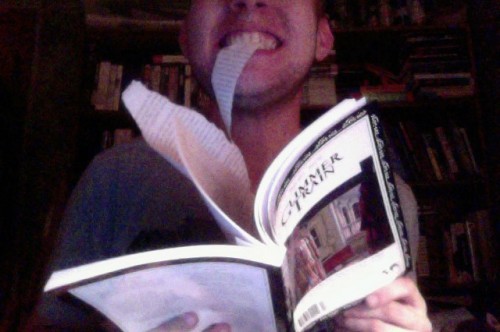
I genuinely enjoy seeing someone’s bogus sense of self-entitlement completely disrupted by the words or opinions of a Deluge contributor. I cannot help that this disrupted person is almost always a white heterosexual male.
I’m obviously not doing any of this for approval from others. I don’t care if anyone disapproves of the kind of writing I’m distributing. I’m doing this to challenge readers. I’m doing this so people who are pissed off about a specific experience or situation have an outlet other than Facebook. I’ve been doing this since 2009 and I plan to continue doing this.
All joking aside, I think everyone should read Deluge because it is a celebration of bodies in the sense that I frequently choose to publish work by writers opposed to phobic violence against all bodies. I am sharing stories of bodies engaged with the resistance of corporate bodies.
And here let me quote myself:
The contents of an issue of Deluge is so many things at once. It might involve a critique of whiteness or the regulations that exist within sociality. It might contain work that is belligerently orgiastic and, at the same time, it might even contain work that is anti- male orgasm. Deluge is a bookshelf on which Solanas’s SCUM Manifesto and Warhol’s Blue Movie transcript both rest. Deluge is when Kim Vodicka writes, “Yes, I am a big ‘ol bitch, and you best / stand behind me. / Feminist is next to godliness.” It is when Roberto Montes writes, “I hear an October voice / Telling me to fuck / Is this racist / The white boys ask / When they grab my butt / Really wondering / How anyone could be different / Or turned like a gasket out.” When Monica McClure writes, “But all I really want / is to live a good life / paid for by someone who feels / illiterate in symbolic systems of manhood / For him I will fill a bathtub / with expensive rosewater / that I got for free in swag bags / I’ll stuff holes with pure sugar cane / bought with the IMF budget of countries / who failed to understand the compromising / nature of relationships.” It is when you and Gary write lines like, “the wilderness knows i am a real fucking pig, and apples my mouth, over and over / i let myself get frosted by all the men dressed as trees.”
Shit happens. Poetry happens. “Same shit, different bidet,” READ MORE >
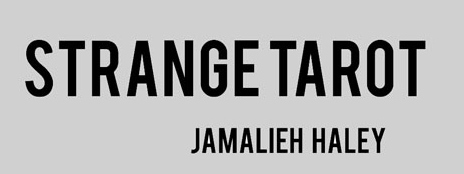
1) Reading and experiencing “Strange Tarot” is like spying on a tenuous and tense relationship in which one part of a self guides and chides the other. At some points, even, it feels like it incarnates you. (Most Tarot Poetry’s an exhausting exercise in ekphrasis. Yawn. That, or the Tarot Poems range so far afield that there’s nothing Tarot about them. Jamalieh Haley’s “Strange Tarot” is still very much Tarot—superficially, in titles, imagery and in the way the poems on the page are shaped like Tarot cards—but indeed a strange, strange Tarot, benefiting and enhanced greatly from psychedelic imagery that only issues from a highly pressurized and agitated mental state.)
“Arrive inside your silhouette. Open the china. Do anything there.”
2) The critical element of Tarot is the relationship between the fortune teller and the supplicant. And, for me, in Strange Tarot the self is telling itself its own fortune. The self betrothed to itself. And this “conversation” (or fortune telling) within the self, which we are privileged to enjoy and shudder at, is rife with flaring tensions and instability, extrusions of cruelty and violence verging constantly towards, like suicide, a kind of desperate, ritualized and salvational make-up sex. Yes, the fire of consummation is what will save and consume.
And let me say again how lucky we are to be overhearing and looking in on this lover’s quarrel of the soul (and itself).
“throw down salvation to the beast you demand.”
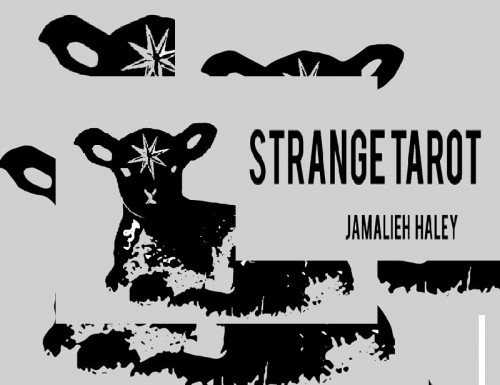
“. . .cut up your head into a paper mask and transform everything into the sun.”
3) The voice of these poems is high-strung, edgy, often cruel and sadistic, but READ MORE >

Why should you read my book? I have no fucking clue. I don’t even know why I wrote it, except that doing so was part of a compulsion I have to make things, and the only means I have for doing that, the “talent” I have, is writing. Writing in general, poetry in particular. If it were different, I would have written a novel or a memoir or a scholarly book or something YA.
My book is none of those things. There is some narrative, but it’s pretty fractured, as they say. There are characters, but not the kind you really get to know. I present them from my point of view only. It’s poetry, for Chrissakes! The lyric “I.”
The book is about me and my life, but also other lives I wish I’d had. Or think I wish I had. It is about struggle, though is decidedly not “My Struggle.”
Overall, it’s pretty adult. By which I don’t mean porn, though there is a fair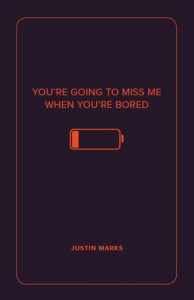 amount of sex (not) happening in the book. It’s about trying to be a grown up and how much that fucking sucks. It’s about choosing a life and then having to actually live it (auto correct tried to change “live” to “love”). It’s about making decisions and having to live with them, which also fucking sucks.
amount of sex (not) happening in the book. It’s about trying to be a grown up and how much that fucking sucks. It’s about choosing a life and then having to actually live it (auto correct tried to change “live” to “love”). It’s about making decisions and having to live with them, which also fucking sucks.
It’s about broken bones. And booze.
Life, death, love and (un)happiness. Kids.
And then, by the end, it’s about realizing what a sick piece of shit you are and having to live with that. Having to figure out a way to be a better person, behave responsibly because, really, the way things are going, it’s just not going to end well.
Or maybe it’s not. Maybe it’s about something else entirely. I don’t know. You tell me. (Justin Marks, 8/2014, NYC)
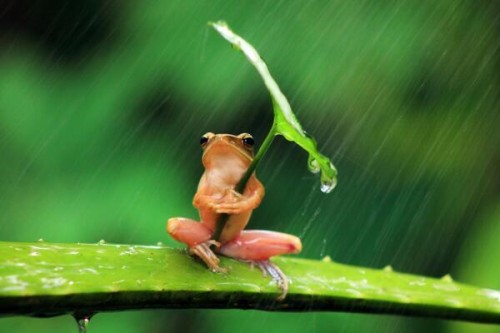
Ahhhhhhh– The Magic of Poetry
******
This is the first of an occasional series in which other people ask me serious and stupid questions about my sex life, how much money I make, gender fluidity, etc, etc. And then I step up on to the stage to give the straight and skinny with as much panache, delicacy and hulking wisdom a human soul can muster post Henry Miller (Ha Ha Ha ha ha):
******
This started up when I was bored and tweeted:
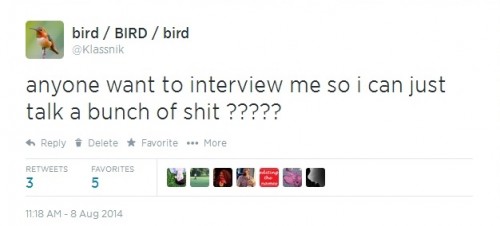
a call for help!!
******
I guess I was really bored. And I guess I was a little bewildered by some interviews I’d read online recently. (It’s better when they call themselves “conversations” and use phrases like “writing process.” . . . I wish I could get all religious here like crazy old Henry Miller. Fevered and romantic. Like a barbecue of militant, bible maniacs: teenagers at an Amy Grant concert.)
So, anyways, Timothy Volpert answered my distress call, sent me some questions, and here’s the Q and A:
One of the most interesting Seattle Author Spotlights that I posted featured Elissa Washuta. And her book “My Body Is a Book of Rules” has just released! You can read the Spotlight here.
And you can order the book here.
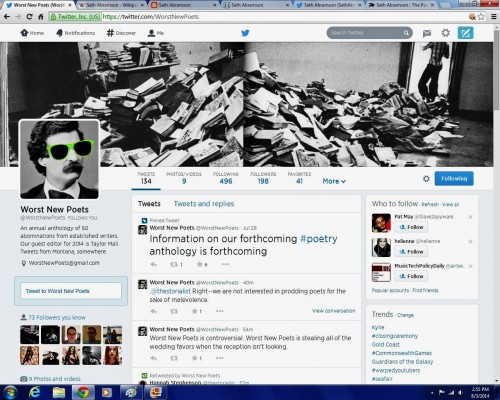
*******
There’s nothing new about anonymous Twitter accounts taking shots at well-known writers. Some of them are funny. Some of them are mean. Some of them are neither. Some of them are both.
But what’s got my attention about Worst New Poets is that they’re engaging with their Followers (internet heavyweights like Elisa Gabbert and Rebecca Hazelton– but enough celebrity name dropping here) in a generally reasonable and intelligent manner. Plus, of course, how can you not show some interest in someone shoving pies in people’s faces?? (But, I wonder, is this something we need?? … I dunno… And what’s the deal?? … I mean, what’s the deal ?? ..)
So, anyways I reached out to Worst New Poets, they responded promptly and politely, and here, now, is the transcript of a quick little Q & A that we did:
*******
Rauan: Please tell me what Worst New Poets is all about ?? (ie: what is it? why are you doing what you’re doing? what good (if any) do you expect to come of it ??)
Worst New Poets: Worst New Poets was originally a spur-of-the-moment response to the annual release of Best New Poets (whom we admire very much). The impulse to start WNP, however, was not unfounded. These thoughts about the poetry landscape have been gestating in our heads—subconsciously maybe—for quite some time. We thought it was an interesting idea to call out some flaws published by established writers, instead of praising 50 “new” poets that were breaking ground in contemporary poetry. We don’t have a set goal in sight, though we do enjoy the discourse that has been generated in the past week, so we don’t think we’ll stop any time soon.
Like we mentioned during the initial barrage of Twitter attacks (exaggerating), we like the idea of creating discourse within a community that far too often promotes from within. There seems to be a clear consensus among writers that the current literary landscape is extremely incestuous, READ MORE >